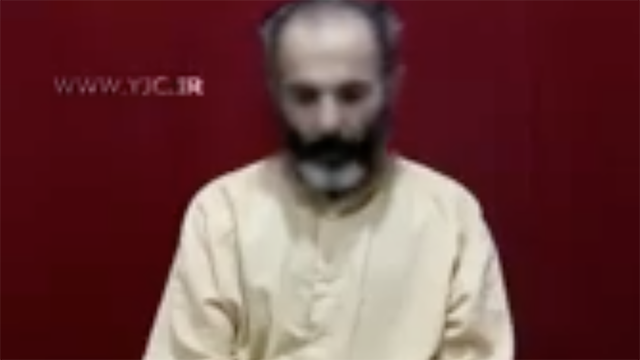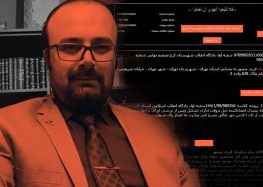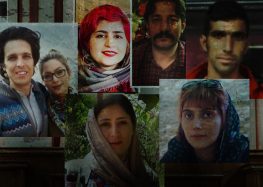Intelligence Ministry Cracks Down on Alleged “Anti-Revolutionary” Telegram Channels

A screenshot of the heavily edited alleged video “confession” of a man identified as “Shahin.”
In the latest crackdown by hardliners against popular social media applications in Iran, the Intelligence Ministry has detained several channel administrators of Telegram. Hardline domestic news outlets have subsequently aired admins’ alleged video “confessions.”
Telegram is a mobile instant messaging application that also allows users to create membership-based online content channels and groups.
The ultra-conservative Fars News Agency, which first reported the arrests on February 2, 2017, claimed the crackdown was aimed at breaking up a ring of “domestic agents” (indirect reference to “spies”) in several Iranian provinces.
Fars, which is closely aligned with the Revolutionary Guards, also claimed that one of the targeted Telegram channels, Guard-e-Javidan (Immortal Guards), was being directed by “anti-revolutionaries” (dissidents) based abroad.
The Immortal Guards were a unit of ancient Persia’s military forces; the Telegram channel’s name suggests that whoever created it favors a secular government for Iran.
The same day the arrests were reported, the hardline Young Journalists Club, a branch of Iran’s state-funded broadcasting organization (also known as IRIB), posted a video of the alleged “confession” of a man introduced as “Shahin.”
In the blurry, heavily edited video, a man appears to be telling someone not filmed by the camera that he is an administrator of the Immortal Guards Telegram channel based in Khuzestan Province.
Televised forced “confessions” in politically motivated cases, often extracted under the threat of or actual torture, are a common practice in Iran.
The latest attempt by hardliners to counter the growing popularity of Telegram, which is used by an estimated more than 20 million people in Iran, comes amid intensifying criticism by hardliners of President Hassan Rouhani’s government for allegedly failing to properly censor online content.
Ayatollah Nasser Makarem Shirazi, a conservative senior cleric in Qom, claimed on January 30, 2017 that Rouhani has “no serious intention” of limiting access to anti-Islamic content on the Internet. He also called for the improvement of the Islamic Republic’s recently launched domestic Internet.
“We must increase the National Information Network’s (domestic internet’s) bandwidth and decrease (access to the world wide web) so that it would be harder to access places like Instagram or Telegram,” said Shirazi.
“We need serious determination to combat this problem, but I don’t see it coming from the top (Rouhani administration),” he added. “We even have a “Working Group to Determine Instances of Criminal Content” on the internet, but they are not showing that they care.”
The Campaign for Human Rights in Iran has also learned that Rouhani has been asked by ultra-conservative Tehran Prosecutor Abbas Jafari Dowlatabadi to ban Telegram ahead of the upcoming presidential election scheduled for May 19, 2017.
Rouhani has yet to respond to the request, an informed source told the Campaign, but his administration refused to comply with similar pressure from hardliners to block popular apps, including Telegram, ahead of the country’s February 2016 elections for Parliament and the Assembly of Experts.
Since 2014, the Office of the Supreme Leader, the Judiciary, the Qom Theological Seminary and the police have called on the Rouhani government to limit or ban access to Telegram because it allows users to share content deemed by hardliners as “anti-revolutionary,” “immoral” and “anti-religious.”
In other words, hardliners have been trying to counter Telegram’s popularity because they believe it enables domestic political dissent.






